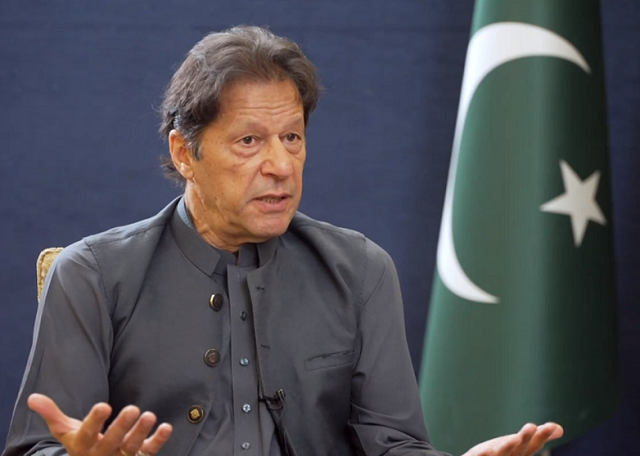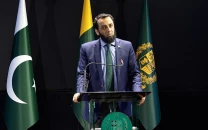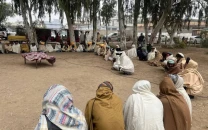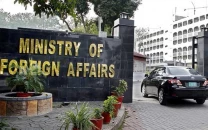Pakistan to work with Afghan govt to contain TTP threat: PM
Imran believes the US can work with Taliban to promote common interests

Prime Minister Imran Khan said on Friday Pakistan would work with the authorities in Afghanistan to halt Tehreek-e-Taliban Pakistan (TTP) and other sources of terrorism emanating from the neighbouring country.
He said Pakistan was “extremely concerned” about the threat of terrorism from Afghanistan, particularly from the TTP, which had carried out thousands of attacks against Pakistan from the Afghan territory with the sponsorship and support of “certain hostile intelligence agencies”.
In an exclusive conversation with senior journalist Tom O’Connor of the Newsweek magazine via email, the prime minister pointed out that the “plethora of terrorist groups” could take advantage of the conflict in Afghanistan.
Imran mentioned that the TTP had also been responsible for most of its attacks on Chinese citizens working in Pakistan, perhaps with the support of the East Turkestan Islamic Movement (ETIM). He stressed the need for working with the authorities in Afghanistan to neutralise those terrorist groups.
The prime minister emphasised that both Pakistan and the United States needed to prevent terrorism arising from Afghanistan. He said that Pakistan desired a comprehensive, and not selective, approach to neutralising the terrorist threats from Afghanistan.
“We will cooperate with the international community, including the United States, in this effort,” he said. “The last thing Pakistan wants is more conflict and turbulence in Afghanistan”.
After 20 years of military intervention in Afghanistan, he said the international community could not exonerate itself from its responsibilities towards the people of Afghanistan and “must stay engaged”.
Read More: Afghanistan and the sad confusion of a superpower
“It is our hope that Afghanistan will be stabilised, through humanitarian help, economic support, and connectivity and infrastructure projects, and that the US, China and Russia will all contribute to pacifying and reconstructing Afghanistan,” he said.
On the immediate impact of the US military withdrawal from Afghanistan on Pakistan and the region, the prime minister said that the Taliban had gained control over the entire country for the first time in 40 years, so there was the hope that security could be established.
“A peaceful Afghanistan will be beneficial for Pakistan, opening up possibilities for trade and development projects,” he said. As for China, he added, any offer of economic support to Afghanistan, would be naturally accepted by Afghans.
He mentioned that the Taliban had welcomed the prospects of being incorporated in the China-Pakistan Economic Corridor (CPEC) and establishing close relations with Beijing. He stressed that the US could also play an important role in Afghanistan by contributing to its recovery and reconstruction.
“I believe that the US can work with a new government in Afghanistan to promote common interests and regional stability,” the prime minister said, referring the working relationship established between the two sides during the the Doha peace process.
Asked specifically, if Pakistan intended to recognise the new Islamic Emirate of Afghanistan, he replied that Pakistan would prefer to reach a decision regarding recognition of the new government together with other neighbours of Afghanistan.
However, he stressed that since the Taliban had established an “acting government”, Pakistan was obliged to engage with the de-facto authorities in Afghanistan to prevent an economic and humanitarian collapse and the resurgence of terrorism.
“Once a government in Kabul establishes control over the entire country, it would legally qualify for recognition,” he said.
Responding to a question about the Quadrilateral Security Dialogue, Imran said that Pakistan had its own viewpoint over the credibility of this strategy. “In our view, India will never confront China, especially not to serve the US strategic objectives,” he said.
The prime minister said that India’s purpose in massive arms build-up was to establish its hegemony in South Asia and especially to threaten and coerce Pakistan. He pointed out that 70% of all Indian military capabilities were deployed against Pakistan, not China.
“Therefore, Pakistan has legitimate concerns about the provision of the most advanced weapons and technology to India,” he said. He termed the current US-China rivalry as “unnecessary and contrary to the interests of both global powers”.
On the Shanghai Cooperation Organization (SCO), he said the Pakistan attached importance to the organisation, and added that if India adopted a positive position in relations with Pakistan, it could serve as a useful platform to promote stability and prosperity across the Asian continent.
About CPEC, he said that China had already invested around $25 billion for the projects while additional projects worth $20 billion were under implementation. Projects worth a further $25 billion are in the pipeline, he added.
Evaluating the successes and failures of the United States’ war on terror over the course of the past two decades, he said Al-Qaeda, the organisation responsible for 9/11, had been decimated in Afghanistan, “largely due to Pakistan-US counter terrorism cooperation” over the past 20 years.
However, he stressed that the root causes of terrorism—the underlying conflicts and disputes, and economic and social injustice—had not been addressed. “As a result, the ideology and narrative of terrorist groups have proliferated across several regions of the world, including Africa, and new terrorist organisations have emerged,” he said.
He pointed out the strongest manifestation of Islamophobia in India’s extremist Hindutva ideology, which had unleashed state-sponsored terrorism against the Muslims of occupied Jammu and Kashmir and the 200 million Indian Muslim minority.
He said the world needed a new and comprehensive global counterterrorism strategy to address these new manifestations of terrorism.



















COMMENTS
Comments are moderated and generally will be posted if they are on-topic and not abusive.
For more information, please see our Comments FAQ